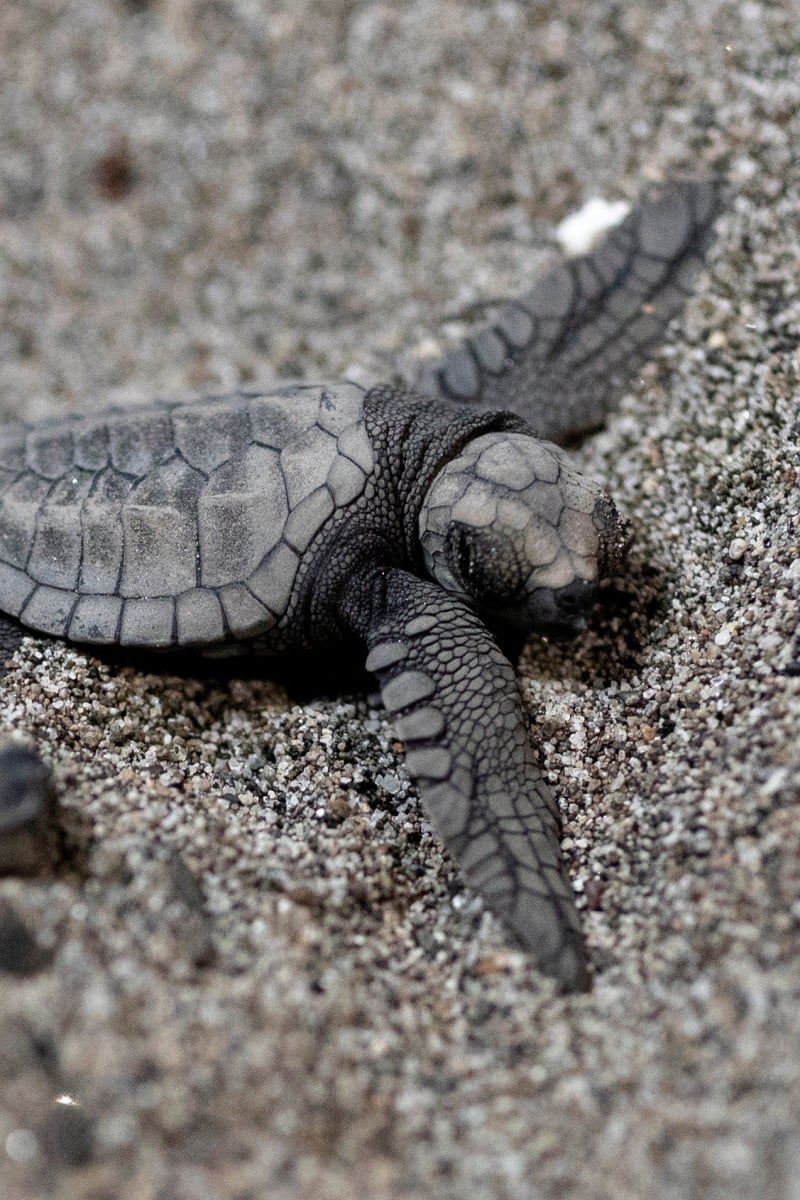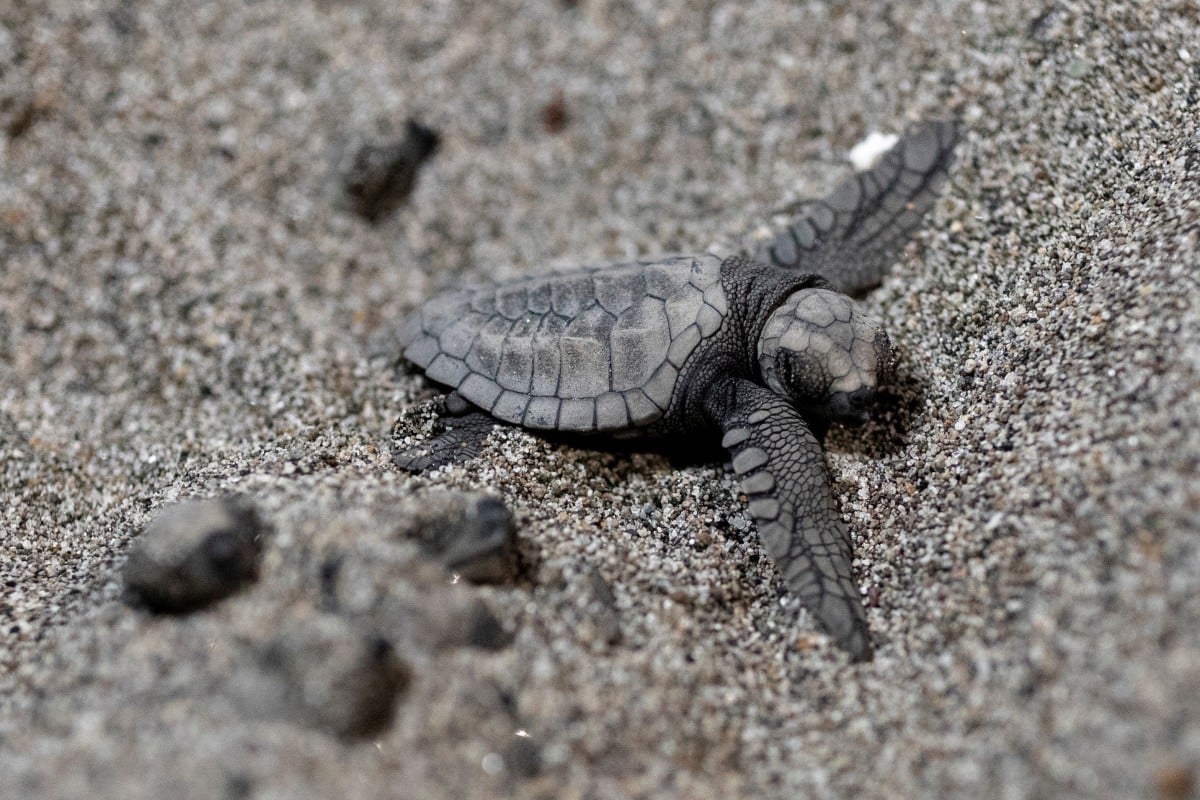
- Conservation programme CURMA has transformed poachers into allies by offering incentives and training to help save thousands of animals
- Volunteers are paid to collect eggs, which are then are transferred to a hatchery to be reburied in protected areas
 A baby olive ridley sea turtle emerges from its nest in a CURMA hatchery in San Juan, La Union, Philippines on December 20, 2022. Set up in 2009, CURMA, or Coastal Underwater Resource Management Actions, is leading the conservations programme around La Union beaches. Photo: Reuters
A baby olive ridley sea turtle emerges from its nest in a CURMA hatchery in San Juan, La Union, Philippines on December 20, 2022. Set up in 2009, CURMA, or Coastal Underwater Resource Management Actions, is leading the conservations programme around La Union beaches. Photo: ReutersArmed with a wooden stick, a bucket and a headlamp, Philippine construction worker Johnny Manlugay hunts every night for the eggs of sea turtles on the pristine beaches of the northern province of La Union.
The 55-year-old can easily spot nesting sites, having been trained in his youth by his grandfather how to track the animals and their eggs, which his family traded at the time or ate.
But his egg-stealing days are over. Now Manlugay has turned his skills to helping protect marine turtles on the provincial beaches favoured by the endangered Olive Ridley species to build nesting sites.
Coral bleaching due to climate change is causing ‘unnecessary’ fish fights
“I’ve learned to love this work,” said Manlugay, who was accompanied by his two dogs. “We didn’t know poaching was illegal and that we should not eat turtle eggs and meat.”
He carefully transferred each egg into his pail, along with some sand from the turtle nests, to be turned over to the group spearheading a conservation programme on the beaches, Coastal Underwater Resource Management Actions (CURMA).
All five species of sea turtles found in the Philippine archipelago – Green, Hawksbill, Loggerhead, Leatherback, and Olive Ridley – are endangered.
Slaughtered for their eggs, meat and shells, the turtles, or “pawikan” as they are called, also face threats from trade, hunting, habitat loss and climate change.
But the conservation effort established in 2009 has transformed sea turtle poachers into allies, offering incentives and training to help save thousands of turtles and keep their eggs from ending up in markets and on plates.
“We talked to the poachers, and it turned out poaching was just another means for them to earn a living,” said Carlos Tamayo, the programme’s director of operations. “They had no choice.”
In Mexico, endangered monarch butterflies inspire hopes of a comeback
Sea turtles lay 100 eggs to a nest on average, while the numbers of nests range between 35 and 40 each season, which runs from October to February.
Tamayo added that the figure had doubled during the first year of the coronavirus pandemic. At a time when disease curbs kept people indoors, there was a rebound in many aspects of animal activity.
“Last season alone, for example, we had 75 nests and we released close to 9,000 hatchlings,” Tamayo said.
Volunteers receive 20 pesos (US$0.37) for each egg collected, or four times what they might earn from selling them. The eggs are transferred to the programme’s hatchery to be reburied in protected areas.
Former poacher Jessie Cabagbag, who grew up eating turtle meat and eggs, said the extra income from egg collection went a long way for his family, which relies mainly on fishing for its livelihood.
“The incentives help us pay for our food and electricity bill. When I got lucky, I was able to save and use it to buy a tricycle which I use (to ferry passengers) when I could not go out to fish, so that’s another source of income,” he added.
Cabagbag, whose wife and seven-year-old son accompany him in patrolling the La Union beach of Bacnotan, has handed more than 1,000 eggs to CURMA since October.
The battle to save an endangered Panamanian turtle at the centre of an aphrodisiac superstition
“I stopped poaching when we underwent training and were taught that what we have been doing was illegal, and that these species of turtles are endangered,” said the 40-year-old.
Tourists flock to the spectacle of the blue-grey hatchlings scurrying madly down the sloping beach to reach the water after they are released.
The event inspired overwhelming joy in Cabagbag, he said.
“I am truly proud. Even our neighbours, they appreciate what I do, because it is not easy. I am happy that I get to contribute to the conservation of the ‘pawikan’.”